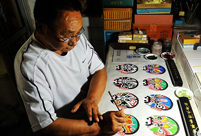 Ceremony volunteers for Youth Olympics make public appearance
Ceremony volunteers for Youth Olympics make public appearance
 A glimpse of female crew of Liaoning aircraft carrier
A glimpse of female crew of Liaoning aircraft carrier
 Stills from "Dad, where are we going?"
Stills from "Dad, where are we going?"
 Legless man's happy life
Legless man's happy life
 Top ten most beautiful islands in China
Top ten most beautiful islands in China
 Aerial view of Hong Kong
Aerial view of Hong Kong
 Happy life in Xinjiang
Happy life in Xinjiang
 2014 China Hainan Int'l Automotive Exhibition kicks off
2014 China Hainan Int'l Automotive Exhibition kicks off
 Collection of 'China Dream' public-spirited ads
Collection of 'China Dream' public-spirited ads
 The silent holy stones
The silent holy stones
BRASILIA, July 17 -- Chinese President Xi Jinping and his Brazilian counterpart, Dilma Rousseff, pledged Thursday to further consolidate the comprehensive strategic partnership of coordination between their countries.
During their talks, the two leaders summarized the successful experiences in the two countries' 40-year-old diplomatic relationship, and charted the course for future bilateral cooperation.
"This year marks the 40th anniversary of the establishment of China-Brazil diplomatic relations. Bilateral ties have been developing steadily in the last 40 years, with political and strategic mutual trust as well as common interests reaching unprecedented heights," said Xi.
China and Brazil have become a "community of shared destiny," he added.
The international landscape is undergoing complex and profound changes, bringing both opportunities and challenges to the emerging-market economies, said the Chinese president.
As two major developing countries and emerging-market economies, China and Brazil are both at a crucial stage of development, said Xi, urging the two sides to work for a more balanced international power structure and promote world prosperity and stability.
Being the second and seventh largest economy in the world, China and Brazil should enhance exchanges and cooperation, deepen strategic coordination, jointly create a favorable external environment for their development and safeguard the common interests of developing countries, Xi added.
For her part, Rousseff said Brazil and China, as the largest developing country respectively in the West and East Hemispheres, share the same views on many strategic issues.
Bilateral ties have become increasingly close and are advancing with unprecedented speed and quality, said the Brazilian president, adding that the two countries are each other's important political, economic, trade and investment partner.
She added that Brazil, which is promoting reform and alleviating poverty for greater development, pays attention to China's reform and opening-up and wishes China success in achieving its long-term development goals.
Brazil stands ready to exchange reform experiences and strengthen all-round cooperation with China, said the president, adding that it is highly important for her country to do so.
Brazil is boosting investment in transportation, infrastructure, agriculture, information, logistics and innovation in science and technology, and welcomes a broader involvement of Chinese enterprises, Rousseff said.
The railway project running from the Peruvian Pacific coast to the Brazilian Atlantic coast will play an important role in promoting Brazil's economic growth and lifting regional development, she said, pledging to "work together with China and Peru to build this project into a satisfactory one."
The Brazilian president said her country supports the expansion of people-to-people and educational exchanges with China, welcomes more Confucius Institutes in Brazil and encourages more Brazilian youths to study in China.
Rousseff suggested that Brazil and China boost cooperation within the frameworks of the United Nations and the Group of 20 (G20), push forward the implementation of the International Monetary Fund reform, advance the establishment of global Internet regulations and governance systems, and promote sustainable development of the world.
Xi suggested that the two countries intensify high-level exchanges as well interaction at different levels and in various fields, actively communicate on governance experiences and coordinate macro-economic policies.
The two countries should comprehensively improve economic and trade cooperation, increase bilateral trade in a steady and consistent manner, and actively launch investment cooperation in industries like electricity and agriculture, said Xi.
The two countries should build a long-term and stable cooperative partnership in mining and oil exploitation, launch strategic cooperation in high-speed railway construction, join hands in building the Brazil-Peru transcontinental railway, and enhance cooperation in finance, science and technology innovation, Internet and people-to-people exchanges, he said.
Xi also suggested the two countries deepen strategic coordination under such multilateral frameworks as the United Nations, the World Trade Organization and the G20, and maintain close contact and coordination on major global issues.
The two heads of state spoke highly of the sixth BRICS summit, noting that the establishment of the New Development Bank and a contingent reserve arrangement is of profound significance to improving global governance and the international economic and financial order.
They also agreed to work together to promote unity and cooperation among BRICS members, which also include Russia, India and South Africa, as well as among all developing countries.
A joint statement on deepening China-Brazil ties was released after the meeting.
The two leaders also witnessed the signing of several cooperation documents and the launch of the Portuguese edition of China's Baidu search engine.
In a joint press conference, Xi stressed that his state visit to Brazil is to enhance cooperation, promote development and strengthen confidence.
Hailing his talks with Rousseff as fruitful, Xi said that the two sides have reached broad consensus, and that China is willing to work with Brazil to turn this visit into an opportunity to enhance communication and cooperation, deepen strategic mutual trust and create a brighter future for bilateral ties.
Rousseff said that Brazil will work with China to make positive contribution to building a peaceful, democratic and inclusive world, adding that her country supports China's bid to host the 2022 Winter Olympic Games.
The two leaders also attended the closing ceremony of the 2014 session of the China-Brazil Business Council.
Brazil is the first leg of Xi's ongoing Latin America tour, which will later take him to Argentina, Venezuela and Cuba.
 Moms on their kid’s coming out
Moms on their kid’s coming out Chinese fighters through lens
Chinese fighters through lens
 Children attend gymnastics training in summer
Children attend gymnastics training in summer
 Beautiful sceneries along the special travel route in Xinjiang
Beautiful sceneries along the special travel route in Xinjiang
 Beauty SWAT member in Xinjiang sparks online frenzy
Beauty SWAT member in Xinjiang sparks online frenzy
 Germany beat Argentina 1-0 to win World Cup
Germany beat Argentina 1-0 to win World Cup
 National fitness team members integrate traditional and modern beauty
National fitness team members integrate traditional and modern beauty Collection of 'China Dream' public-spirited ads
Collection of 'China Dream' public-spirited ads  How Chinese men kill the time when their wives practice square dancing?
How Chinese men kill the time when their wives practice square dancing? Top 10 most beautiful islands in China
Top 10 most beautiful islands in China
 Zhou Xun announces engagement to Archie Gao
Zhou Xun announces engagement to Archie Gao
 Photos of the Week
(July 6 - July 12)
Photos of the Week
(July 6 - July 12)
 'Super moon' seen in Beijing
'Super moon' seen in Beijing
 One-legged women with high heel goes viral on Internet
One-legged women with high heel goes viral on Internet China's largest 3D printer builds 2-meter-long boat
China's largest 3D printer builds 2-meter-long boat
Day|Week|Month